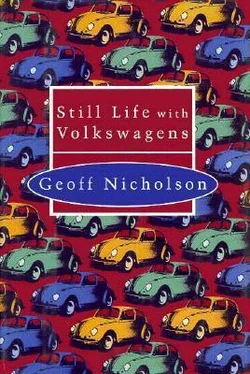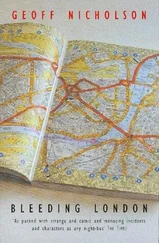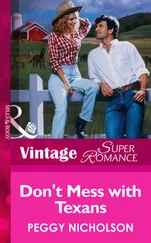“Sure,” says Les.
“These are vehicles of the Apocalypse, make no mistake.”
“Okay, I won’t,” says Les.
Phelan moves among the cars. He touches them lightly with his fingertips. At one point it looks as though he might bend over and kiss one of them. He opens the door of the nearest of them and-moves in behind the wheel. He is a man transported.
“Les,” he says, “you’re a superman.”
♦
Barry doesn’t feel so good. He feels that life on the road doesn’t suit him nearly as well as it used to do. He isn’t sure what’s changed, whether it’s him or the road. Certainly he still enjoys the driving, the opportunity to philosophise, the sense, albeit spurious, of freedom. But there’s too much that he doesn’t enjoy. He could hardly claim to have been bored on this trip, enough has happened to stave off ennui, but most of it has seemed somehow irrelevant.
However, the real reason he doesn’t feel so good is that a fair amount of time has passed and these travels don’t seem to be getting him anywhere, any nearer his goal. He hasn’t found Charles Lederer yet, not even a trace, and he doesn’t see how he’s ever going to. He had begun by believing that instinct would get the job done, that he would find Charles Lederer because he needed to. He doesn’t quite believe that now. He no longer knows where to look for him, in fact sometimes he isn’t even sure that he’d recognise Charles Lederer even if he found him. What if he’s changed his appearance? What if he’s simply gone into hiding? He could be holed up in a hotel, in a squat, in a caravan site. All Barry’s travels will be irrelevant if the object of his quest remains still.
For a long time Barry is too proud to abandon his mission, so he drives on and on, burning fossil fuels, pumping greenhouse gases into the air, wearing down his tyres and wearing out his engine. The milometer spins like the wheels of a fruit machine. The interior of Enlightenment becomes Barry’s whole world. The dashboard, the seat, the steering wheel, the gear lever; these are the only landmarks on his mental map. The world passes before his eyes. He sees it through the windscreen, through a glass smokily, and he is completely detached and uninvolved. The world becomes something viewed on a screen, like a video or a made for TV movie.
He drives without direction and without will. Sometimes he will find himself driving down the quietest, most deserted country track at dead of the night. Sometimes he finds himself in dense, fast-moving motorway traffic in the middle of rush hour. In neither case does he have the slightest idea of where he is or how he got there. The only thing he knows for sure is that Charles Lederer is not there.
And then he hits the M25; one hundred and twenty-five miles of unbroken urban race track. There is something basic and elemental about it. He loves the symbolism, the symmetry, the fact that it is circular, continuous, endless. It seems to speak of natural cycles, of renewal, of the eternal return. Starting anywhere you would pass all possible destinations before returning to the place from which you started. Traffic revolves, comes and goes, uses the M25 as a way of avoiding London, of skirting the issues. Most drivers use only a part of its orbit, but Barry wants to go all the way.
He drives round and round the M25, and as he travels he feels less and less of anything, driving on automatic pilot, operating on pure instinct, overtaking, manoeuvring, becoming part of it all, experiencing a loss of self, an end of separation, experiencing a feeling of absolute unity, though he would be hard-pressed to say what he was becoming united with, possibly with an abstract notion of movement, with windrush, with road noise, with nothing human.
After a certain number of circuits it all becomes familiar, becomes his home territory, his motorway. The names on the road signs are his places. They read like a mantra: Swanley, Wisley, Leatherhead, Potters Bar, South Mimms. Passing through the Dartford tunnel, burrowing deep below the Thames, becomes a ritual of rebirth.
Days go by, nights go by. Barry goes on; not sleeping, not eating, not washing or shaving. He stops only to excrete and to take on fuel. He is a new man, a man possessed, a man in touch with a quite different reality.
Enlightenment eats up the miles. The pistons move in their cylinders, valves open and close, camshafts and crankshafts revolve, heat exchangers exchange heat. The wheels go round, the accelerator and clutch work in harmony. Slave cylinders and fuel lines and the wiring loom and carburettors and shock absorbers and spark plugs all operate in a state of mystical interdependence.
And then, without warning, it is suddenly all over. He crests the brow of a hill. He isn’t exactly sure where he is — though there are road signs for Heathrow Airport nearby — when all at once Enlightenment dies under him. There is a brief, undignified spluttering, a slight judder and then nothing. Barry presses the accelerator, turns the key in the ignition, moves up and down the gears, but it makes no difference. The car drifts down the hill, slowing all the time. Other traffic pulls out around him to overtake. For Barry it is like waking from a dream. Now that he is out of touch with his mechanical carapace he is given back to himself. He blinks, looks around him, sees the world through new eyes, doesn’t know what he’s looking at. He steers the car onto the hard shoulder, brings it to a halt. He switches on the warning lights. He feels empty. He feels as though he is peering into some bottomless well. He slumps over the steering wheel, spent and hollow and exhausted. He falls into weird, edgy dreams about Marilyn; she is riding a Volkswagen trike, eating raw fish, transforming into a vampire, being chased by skinheads.
He is awoken abruptly some time later, though he doesn’t know how much later, by a rap on the side window of Enlightenment. He is disoriented. Someone is looking at him through the window, a young black man who is saying, “Need any help, man?”
Barry cannot deny that he does. He wonders if this stranger belongs to the police or is an AA man, but now he sees the car he’s driving, and it’s a metallic turquoise and peppermint green Beetle with suicide doors, not a vehicle much favoured by the AA or the police.
“My name’s Zak,” says the young man. “You want me to take a look at the car for you?”
“Well, yes, that would be very kind of you.”
Zak looks at the engine, tries to start it. He plays with this and that. After the briefest inspection he is able to tell Barry that he’s run out of fuel. Barry looks surprised.
“Maybe you’ve got a leak,” says Zak. “When did you last fill up?”
“I can’t really remember.”
Zak looks at the state of Barry, at his half-closed eyes and his weary manner and says, “When did you last get any sleep?”
Barry can’t remember that either. Then Zak asks where he’s going, and that’s the hardest question of all.
Zak says, “I can give you some petrol, but you’ve got to promise me you’ll get off the motorway and have a rest.”
Barry nods helplessly and puts himself in Zak’s hands. Zak siphons petrol from one Beetle to another. As he works he says, “I always stop if I see a fellow Beetle-owner in trouble. And these days I find myself stopping more and more.”
“Really?”
“Yeah. They always seem to be breaking down.”
“Not this one,” says Barry. “This one’s different.”
“Well it looks different, that’s for sure, but underneath they’re all the same, aren’t they? Sometimes I think I’ve had enough of mine really. I keep thinking I’m going to sell it. I think about taking it to one of those big Volkswagen meetings and selling it there. There’s a big one coming up soon. Maybe you’ll be there.”
Читать дальше












